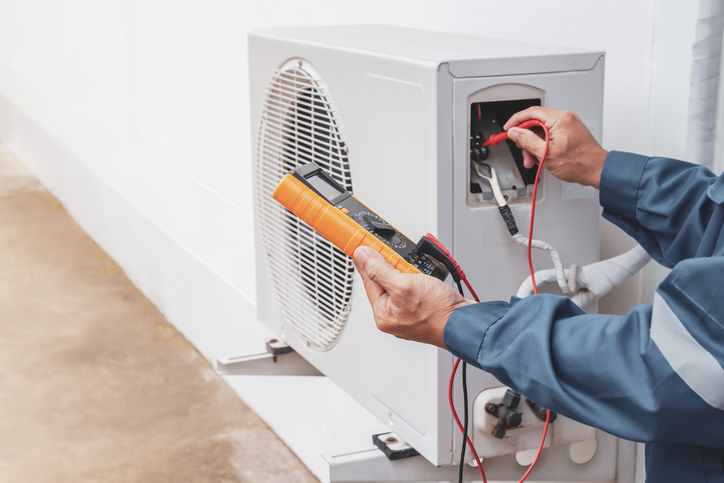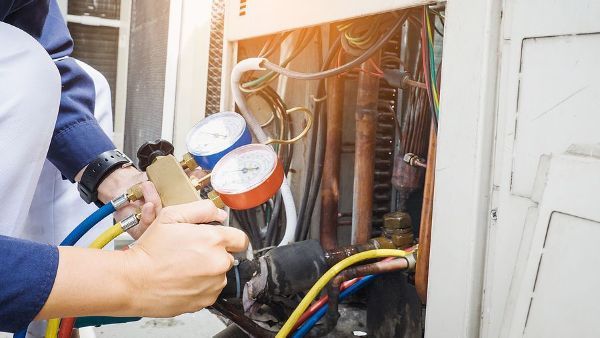AC repairman checklist: key parts to check
The Relevance of Cooling And Heating Knowledge: Uncovering Root Causes Of A/c Problems for Property Owners
House owners typically overlook the importance of understanding their a/c systems. Acknowledging usual indicators of a/c issues can result in prompt treatments. Concerns like not enough air conditioning or unusual sounds are not just inconveniences; they can indicate much deeper problems. By exploring the origin of these problems, property owners can enhance system performance and prolong its lifespan. What are one of the most common problems that can arise, and just how can they be effectively addressed?
Typical Signs of Air Conditioner Issues
Exactly how can property owners determine issues with their air conditioning systems before they escalate? Identifying usual indicators of air conditioner troubles is necessary for timely upkeep. One prevalent sign wants air conditioning; if the cooling system falls short to reduce the indoor temperature level, it might signal underlying concerns. Uncommon sounds, such as grinding or hissing, can likewise show mechanical failings or loose elements - ac unit replacement. Additionally, house owners should watch out for unusual smells rising from the unit, which could suggest mold and mildew growth or electrical issues. Constant cycling on and off, called short biking, can suggest thermostat problems or refrigerant leaks. In addition, an increase in energy bills without an equivalent rise in use may indicate inadequacy. By remaining sharp to these indication, house owners can protect against much more considerable concerns and expensive repair work, ensuring their a/c systems run effectively throughout the warmer months

Comprehending Refrigerant Issues
Refrigerant issues can greatly influence the effectiveness of a cooling and heating system. Home owners should be mindful of the indications of low refrigerant degrees and the importance of discovering cooling agent leakages. Dealing with these problems quickly can avoid more damages to the system and guarantee optimal cooling down performance.
Reduced Cooling Agent Levels
A common problem that homeowners may run into with their a/c systems is low cooling agent levels, which can considerably impact the system's effectiveness and efficiency. Refrigerant is essential for the cooling process, absorbing warm from interior air and releasing it outside. When degrees go down, the air conditioning system battles to cool the room efficiently, causing raised power consumption and prospective system strain. Signs of reduced cooling agent consist of inadequate air conditioning, longer run times, and ice formation on the evaporator coils. Property owners might also observe unusual sounds as the compressor functions harder to make up for the shortage. It is important for property owners to comprehend the significance of maintaining appropriate cooling agent levels to ensure peak HVAC efficiency and durability.
Refrigerant Leaks Discovery
Where might a homeowner begin when confronted with the opportunity of refrigerant leaks in their cooling and heating system? The initial step entails keeping an eye on the system's performance. Indicators such as decreased cooling performance, ice development on coils, or hissing audios might indicate a cooling agent leakage. House owners should additionally examine for visible indications of oil residue, frequently an indicator of a leak. Utilizing a refrigerant leakage detector can supply more accurate recognition. If uncertainties continue, seeking advice from an accredited cooling and heating technician is vital, as they possess the know-how and tools to find leaks effectively. Prompt discovery and repair of refrigerant leaks not only improve system effectiveness however likewise prevent potential ecological damage, making it a vital aspect of cooling and heating upkeep.
Electrical Failures and Their Influence
Electrical failures can substantially affect HVAC systems, specifically with concerns like breaker breakdowns and faulty wiring. These problems not just interfere with the system's performance however can additionally bring about pricey repairs and security risks. Understanding the implications of such failures is essential for house owners to maintain an effective and secure HVAC setting.
Breaker Issues
Exactly how can circuit breaker problems impact the performance of a cooling and heating system? Circuit breakers act as critical security tools that take care of electrical flow to a/c systems. If a breaker journeys frequently, it disrupts power supply, resulting in irregular heating or cooling. This can cause considerable stress on the system, causing inefficient operation and prospective damages to elements. Home owners may see increased energy costs due to the cooling and heating system's battle to keep wanted temperatures. Furthermore, duplicated disturbances from stumbled breakers can reduce the life-span of the AC unit, calling for costly repair work or replacements. Normal maintenance of circuit breakers is important, as it guarantees a stable power supply, eventually boosting the general performance of the cooling and heating system.
Faulty Wiring Effects
Regularly neglected, defective wiring can have alarming effects for HVAC systems. Circuitry concerns may result in brief circuits, leading to frequent malfunctions and boosted repair work expenses. Furthermore, inappropriate circuitry can cause inefficient power use, causing higher utility bills and pressure on the system. In serious situations, faulty circuitry can set off electric fires, positioning a considerable safety danger to property owners. These electric failings can damage A/c components, resulting in expensive substitutes or considerable repair services. Home owners ought to focus on regular evaluations by qualified professionals to determine and fix wiring issues before they intensify. Recognizing the implications of malfunctioning circuitry can assist assure the longevity and security of a/c systems, inevitably safeguarding both the site here home and its owners.
Clogged Filters and Their Consequences
While several house owners might overlook the importance of normal filter maintenance, stopped up filters can bring about considerable repercussions for cooling and heating systems. When filters come to be obstructed with dust, dust, and particles, airflow is limited. This reduction in airflow forces the system to function harder, leading to raised energy intake and potentially greater utility expenses. With time, this stress can trigger damage on elements, causing early system failure.
In addition, blocked filters can jeopardize indoor air quality. Contaminants and irritants may circulate throughout the home, intensifying breathing problems and allergic reactions for owners. Insufficient airflow can create the evaporator coil to ice up, leading to costly repairs and ineffective air conditioning performance. Consistently altering or cleansing filters is redirected here a straightforward yet necessary maintenance task that can assist assure the longevity and performance of a/c systems, ultimately profiting both the property owner's comfort and their financial resources.

Thermostat Malfunctions Described
What occurs when a thermostat malfunctions can considerably influence both comfort and energy effectiveness in a home (AC repairman). A faulty thermostat may fall short to properly check out the temperature level, causing overcooling or not enough cooling. This disparity can trigger pain for passengers and cause greater energy bills, as the a/c system works tougher than essential
Common problems consist of dead batteries, which can render electronic thermostats inoperative, and loosened wiring that disrupts interaction in between the thermostat and the HVAC device. Additionally, out-of-date or badly calibrated thermostats might not react appropriately to temperature changes, even more worsening energy inefficiency.
House owners need to be vigilant for signs of malfunction, such as irregular temperatures or unanticipated power prices. Regular checks and understanding of the thermostat's functionality can aid identify issues early, ensuring peak efficiency of the HVAC system. Dealing with thermostat issues immediately is vital for keeping a comfy living environment and managing energy usage effectively.
The Function of Routine Maintenance
Normal upkeep plays an important role in guaranteeing the long life and effectiveness of a/c systems. Home owners that focus on routine checks can stop minor problems from intensifying into pricey fixings. Normal maintenance normally consists of jobs such as cleaning up filters, examining ductwork, and checking heating cooling unit cooling agent levels. These activities assist maintain excellent air movement and system efficiency, minimizing energy intake.
Additionally, a well-kept cooling and heating system runs a lot more efficiently, giving consistent convenience throughout the home. Routine tune-ups can likewise expand the life-span of the system, causing substantial cost savings in time. Homeowners are encouraged to arrange professional inspections at least yearly to identify prospective problems early.
On top of that, many producers require normal upkeep to promote service warranties, making this technique not just valuable but commonly needed. Generally, comprehending the importance of routine maintenance empowers property owners to protect their HVAC systems against unanticipated failings and improve their investment in home comfort.
Frequently Asked Questions
How Can I Improve My A/c's Power Efficiency?
Improving an a/c's power performance entails regular upkeep, cleansing or changing filters, securing ductwork, ensuring appropriate insulation, using programmable thermostats, and scheduling professional assessments to recognize and remedy potential issues affecting efficiency.
What Is the Lifespan of a Typical Cooling Device?
A normal a/c unit has a life expectancy of 15 to two decades, depending on upkeep, use, and ecological aspects. Routine maintenance can significantly expand its operational life and improve general effectiveness.
When Should I Change My Cooling System?
A cooling system ought to usually be replaced every 10 to 15 years. Indicators for replacement include regular repairs, rising energy costs, and insufficient cooling, suggesting that an upgrade may be more cost-effective and effective.
Can I Troubleshoot AC Troubles Myself?
Yes, people can troubleshoot AC problems themselves by checking filters, ensuring power supply, and examining for noticeable problems (HVAC contractor). Nevertheless, complex problems usually call for specialist assistance for precise medical diagnosis and risk-free repair work, making sure optimal system efficiency
Exactly how Do I Pick a Reliable A/c Technician?

To choose a reliable cooling and heating service technician, one must seek suggestions, inspect online evaluations, confirm licenses and insurance coverage, examine experience, and request in-depth price quotes to ensure quality solution and fair pricing before choosing.
Verdict
To sum up, a solid understanding of HVAC systems allows house owners to efficiently identify and attend to usual air conditioning concerns. Recognizing indicators such as inadequate cooling or rising energy costs permits timely interventions, which can considerably improve system effectiveness and durability. By remaining informed about prospective troubles like refrigerant leakages, electrical failures, and clogged up filters, homeowners can take proactive procedures to preserve their systems, ultimately guaranteeing comfort and advertising a much healthier living atmosphere. Regular maintenance remains essential to this undertaking.